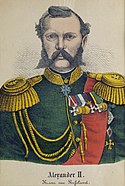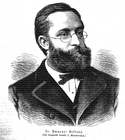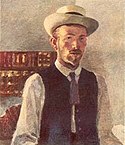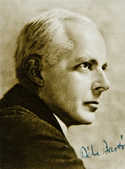1881
| 2. tisíciletí |
◄◄ ◄ 1877 • 1878 • 1879 • 1880 • 1881 • 1882 • 1883 • 1884 • 1885 ► ►►
1881 (MDCCCLXXXI) byl rok, který dle gregoriánského kalendáře započal sobotou.
Události
- Automatický abecedně řazený seznam viz Kategorie:Události roku 1881
Česko
- 11. června – V Praze bylo otevřeno Národní divadlo
- 28. června – Chuchelská řež mezi českými a německými studenty
- 12. srpna – Požár Národního divadla
Svět

- leden – Bitva u Geok-Tepe mezi Ruskem a turkotatarskými kmeny
- 16. února – Začala se budovat Kanadská pacifická železnice
- 13. března – Atentát na Alexandra II. v Petrohradu
- 14. března – Rumunské knížectví bylo povýšeno na Rumunské království a získalo nezávislost na Osmanské říši
- 12. května – Tunisko se stalo francouzským protektorátem
- 16. května – V Berlíně byla zahájena první pravidelná tramvajová doprava na světě
- 28. června – Rakousko-srbská aliance
- 2. července – Atentát na amerického prezidenta Jamese Garfielda
- 15. srpna – 15. listopadu – Mezinárodní výstava elektřiny v Paříži
- 26. září – Anglický Godalming získal jako první město na světě veřejné elektrické osvětlení
- 26. října – Přestřelka u O. K. Corralu v Arizoně
- 8. prosince – Při požáru vídeňského Ringtheateru zahynulo asi 380 osob
- Zákon o nedělní uzávěře ve Walesu – první charakteristický velšský zákon
- Mezinárodní úmluva, která se týkala uzavření Bosporu a Dardanel, tj. úžiny u Černého moře
Probíhající události
- 1879–1884 – Druhá tichomořská válka
Vědy a umění
- 10. dubna – Zahájila provoz první telefonní linka v Čechách, spojující správní budovu Dolu Hartmann v Ledvicích s nádražím v Duchcově.
- 11. června – V Praze slavnostně otevřeno Národní divadlo premiérou Smetanovy Libuše
Knihy
- Henry James – Washingtonovo náměstí
- Tomáš Garrigue Masaryk – Sebevražda hromadným jevem společenským moderní osvěty
- Jules Verne – Cesty na divadle
- Jules Verne – Deset hodin na lovu
- Jules Verne – Tajemství pralesa
Narození
- Automatický abecedně řazený seznam viz Kategorie:Narození v roce 1881
Česko

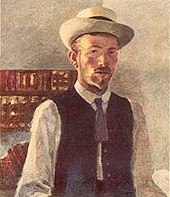
- 1. ledna – Emanuel Chobot, levicový politik polské národnosti († 7. června 1944)
- 6. ledna – Franz Köhler, československý politik německé národnosti († 13. května 1940)
- 9. ledna – Julius Brach, šachista († 4. července 1938)
- 10. ledna – Jan Pelíšek, politik († 1959)
- 1. února – Theodor Bohumír Pařík, hudební skladatel, houslista a pedagog († 28. ledna 1961)
- 7. února – Mařenka Zieglerová, operetní zpěvačka a herečka († 7. listopadu 1966)
- 13. února – Ján Janček, československý politik slovenské národnosti († 4. října 1933)
- 14. února – František Čech-Vyšata, cestovatel a spisovatel († 3. října 1942)
- 27. února – Bedřich Pospíšil, politik († 14. září 1919)
- 11. března – Ladislav Zelenka, violoncellista a hudební pedagog († 2. července 1957)
- 13. března – Alois Kříž, politik († 13. března 1945)
- 14. března – Josef Anderle, profesor technické mechaniky a termomechaniky, rektor ČVUT († 5. února 1959)
- 25. března – Josef Adámek, politik († 19. ledna 1964)
- 26. března – František Koucký, kanovník litoměřické kapituly († 16. ledna 1962)
- 30. března – Josef Čada, mistr světa v gymnastice a olympionik († 1. prosince 1959)
- 3. dubna – Emil Franke, dlouholetý ministr vlád Československé republiky († 1. prosince 1939)
- 5. dubna – Josef Křivánek, jihočeský kamenosochař († ? 1954)
- 6. dubna – Rudolf Bechyně, politik, ministr několika vlád († 1. ledna 1948)
- 17. dubna – Oldřich Liska, architekt, urbanista a výtvarný návrhář († 8. prosince 1959)
- 22. dubna – Franz Werner, československý politik německé národnosti († 15. února 1947)
- 23. dubna – Otakar Šín, hudební skladatel, teoretik a pedagog († 21. ledna 1943)
- 24. dubna – Jan Horák, politik († ?)
- 27. dubna – Wlastimil Hofman, česko-polský akademický malíř († 6. března 1970)
- 5. května – Alfons Bébar, převor kláštera v Domažlicích († 26. února 1940)
- 7. května – Ján Zverec, československý politik slovenské národnosti († 23. května 1965)
- 16. května – Hans Tichý, československý politik německé národnosti († 22. července 1955)
- 26. května – Karl Čermak, československý politik německé národnosti († 31. října 1924)
- 31. května
- Bohumír Bradáč, ministr československých vlád († 20. října 1935)
- František Langr, politik († 6. ledna 1948)
- 4. června
- Jan Kvidera, politik († ?)
- Alois Tučný, politik, odborový předák a ministr († 10. dubna 1940)
- 12. června – Karel Chotek, etnograf († 24. září 1967)
- 13. června – Otakar Španiel, sochař, řezbář a medailér († 15. února 1955)
- 14. června – Betty Karpíšková, politička († 31. října 1942)
- 15. června
- Wilhelm Häusler, československý politik německé národnosti († 6. února 1969)
- Antonín Černý, politik († ?)
- 16. června – Bruno Weigl, hudební vědec a skladatel († 25. září 1938)
- 17. června – Jindřich Ferenc, hudební skladatel a básník († 24. června 1958)
- 19. června – František Gellner, básník, prozaik a kreslíř († asi 13. září 1914)
- 21. června – Josef Matouš, literární kritik a překladatel († 4. ledna 1971)
- 26. června – Ladislav Kučera, politik († ?)
- 3. července – František Vahala, architekt a výtvarník († 24. března 1942)
- 10. července – Zdeněk Záhoř, literární historik, kritik a spisovatel († 16. srpna 1931)
- 31. července – Lída Sudová, herečka († 6. března 1971)
- 3. srpna – J. M. Troska, spisovatel († 3. září 1961)
- 4. srpna – Wenzel Hablik, malíř, grafik a architekt německé národnosti († 23. března 1934)
- 12. srpna
- František Hovorka, varhaník, sbormistr, hudební skladatel a pedagog († 19. ledna 1929)
- Václav Vačkář, hudební skladatel († 4. února 1954)
- 16. srpna – Zdeněk Městecký, atlet-běžec († 15. května 1935)
- 21. srpna – Marie Antonína Kratochvílová, mučednice z 2. světové války († 2. října 1942)
- 24. srpna – Václav Němeček, politik († ?)
- 29. srpna – František Novotný, klasický filolog († 20. září 1964)
- 31. srpna – Karel Trapl, čs. ministr financí († 7. dubna 1940)
- 4. září
- Joe Hloucha, japanolog, spisovatel, cestovatel a sběratel († 13. června 1957)
- František Kysela, malíř, scénický výtvarník († 20. února 1941)
- 5. září – Richard Bienert, předseda vlády a ministr vnitra za protektorátu († 3. února 1949)
- 7. září – Franz Macoun, československý politik německé národnosti († ?)
- 13. září – Zdeněk Mysliveček, neurolog a psychiatr († 11. března 1974)
- 23. září – Jindřich Baumruk, fotbalista a hokejista († 5. května 1963)
- 25. září – Adolf Šelmec, československý politik slovenské národnosti († 20. ledna 1979)
- 26. září – Václav Barták, politik († ?)
- 27. září – Bruno Kafka, československý politik německé národnosti († 12. července 1931)
- 1. října – Ferry Seidl, filmový režisér a herec († 24. ledna 1939)
- 15. října – Antonín Výtvar, sídelní kanovník litoměřické kapituly († 22. prosince 1953)
- 18. října
- Gejza Rehák, československý politik slovenské národnosti († 8. března 1940)
- Quido Maria Vyskočil, spisovatel († 14. srpna 1969)
- 22. října
- Čeněk Fiala, politik († 1952)
- Klaudius Madlmayr, architekt († 30. března 1963)
- Johann Uhl, československý politik německé národnosti († 15. května 1948)
- 25. října – Jaroslav Petrbok, paleontolog, speleolog, archeolog, botanik a spisovatel († 14. prosince 1960)
- 28. října – František Červinka, politik († 1950)
- 4. listopadu – Karel Brožík, politik († 20. června 1942)
- 5. listopadu – Cyril Dušek, politik († 12. ledna 1924)
- 8. listopadu – Josef Náprstek, politik († 9. září 1931)
- 20. listopadu
- Josef Böhm, hudební skladatel, varhaník a sbormistr († 8. ledna 1967)
- Ladislav Pfuster, básník a překladatel († 1915)
- 24. listopadu
- Zdeněk Matěj Kuděj, novinář, cestovatel, překladatel a spisovatel († 8. srpna 1955)
- Vladimír Červenka, politik († 16. prosince 1960)
- Josef Janeba, mistr houslař († 15. října 1954)
- 1. prosince – Josef Kudrna, voják, popraven († 17. května 1915)
- 8. prosince – Ferdinand Heidler, čs. ministr obchodu († 3. listopadu 1928)
- 20. prosince – Tomáš Koupal, katolický kněz, historik († 8. srpna 1952)
Svět


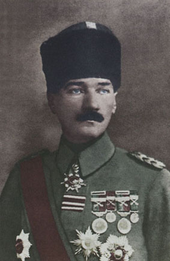
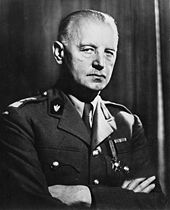

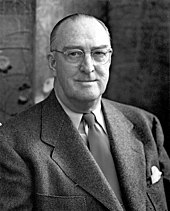


- 4. ledna
- Patrick Ryan, americký olympijský vítěz v hodu kladivem († 13. února 1964)
- Wilhelm Lehmbruck, německý expresionistický sochař († 25. března 1919)
- 9. ledna – Lascelles Abercrombie, britský básník a kritik filozofie († 27. října 1938)
- 17. ledna – Alfred Reginald Radcliffe-Brown, britský sociální antropolog († 24. října 1955)
- 31. ledna – Irving Langmuir, americký chemik a fyzik, Nobelova cena za chemii († 16. srpna 1957)
- 2. února – Miloslav Schmidt, zakladatel sboru dobrovolných hasičů na Slovensku († 8. května 1934)
- 4. února
- Fernand Léger, francouzský malíř a sochař († 17. srpna 1955)
- Kliment Jefremovič Vorošilov, sovětský státník, politik a maršál SSSR († 2. prosince 1969)
- 10. února – Kenneth McArthur, jihoafrický atlet, olympijský vítěz v maratonu († 13. června 1960)
- 11. února – Carlo Carrà, italský malíř († 13. dubna 1966)
- 12. února – Anna Pavlovová, ruská tanečnice († 23. ledna 1931)
- 13. února – Eleanor Farjeonová, britská spisovatelka († 5. června 1965)
- 20. února – Pedro Muñoz Seca, španělský dramatik († 28. listopadu 1936)
- 25. února – Alexej Rykov, sovětský politik († 15. března 1938)
- 27. února
- Sveinn Björnsson, prezident Islandu († 25. ledna 1952)
- Luitzen Egbertus Jan Brouwer, nizozemský matematik a filozof († 2. prosince 1966)
- 10. března – Endre Korláth, československý politik maďarské národnosti († 3. června 1946)
- 14. března – Oswald Herzog, německý sochař a malíř († 1939)
- 17. března – Walter Rudolf Hess, švýcarský fyziolog, Nobelova cena za fyziologii a medicínu († 12. srpna 1973)
- 20. března – Madame d’Ora, rakouská fotografka († 30. října 1963)
- 23. března
- Roger Martin du Gard, francouzský spisovatel, nositel Nobelovy cena za literaturu († 23. srpna 1958)
- Hermann Staudinger, německý lékárník, Nobelova cena za chemii († 8. září 1965)
- 25. března – Béla Bartók, maďarský hudební skladatel († 26. září 1945)
- 26. března – Guccio Gucci, italský obchodník a módní návrhář († 2. ledna 1953)
- 27. března – Arkadij Timofejevič Averčenko, ruský spisovatel († 12. března 1925)
- 28. března – Martin Sheridan, americký trojnásobný olympijský vítěz v hodu diskem († 27. března 1918)
- 29. března – Raymond Hood, americký architekt († 14. srpna 1934)
- březen – Paula Wolf-Kalmarová, rakouská šachová mistryně († 29. září 1931)
- 3. dubna
- Alcide De Gasperi, premiér Itálie († 18. srpna 1954)
- Max Spielmann, česko-německý architekt († 20. června 1970)
- 5. dubna – Noe Ramišvili, gruzínský politik a první premiér Gruzie († 7. prosince 1930)
- 7. dubna – Daisy Ashfordová, britská spisovatelka († 15. ledna 1972)
- 12. dubna – Rudolf Ramek, rakouský kancléř († 24. července 1941)
- 13. dubna – Ludwig Binswanger, švýcarský lékař a psychoanalytik († 5. února 1966)
- 16. dubna
- Anselm Polanco, blahoslavený, španělský mučedník († 7. února 1939)
- Edward Frederick Lindley Wood, britský konzervativní politik († 23. prosince 1959)
- Sergej Kameněv, sovětský vojenský velitel († 25. srpna 1936)
- 18. dubna
- 20. dubna – Nikolaj Jakovlevič Mjaskovskij, ruský hudební skladatel a kritik († 8. srpna 1950)
- 22. dubna – Xenie Petrović-Njegoš, černohorská princezna († 10. března 1960)
- 23. dubna – Naciye Suman, první turecká muslimská žena, která se stala profesionální fotografkou († 23. července 1973)
- 1. května – Pierre Teilhard de Chardin, francouzský náboženský myslitel a vědec († 10. dubna 1955)
- 2. května
- Gottfried Benn, německý lékař a básník († 7. června 1956)
- Şehsuvar Hanımefendi, manželka poslední osmanského chálífy Abdulmecida II. († cca 1945)
- 4. května – Alexandr Fjodorovič Kerenskij, předseda ruské prozatímní vlády († 11. června 1970)
- 8. května – Rudolf Eisler, rakouský architekt († 5. května 1977)
- 11. května – Theodore von Kármán, americký fyzik († 7. května 1963)
- 12. května – Albert Thellung, švýcarský botanik († 26. června 1928)
- 13. května – Johannes Schultze, německý historik († 2. října 1976)
- 19. května – Mustafa Kemal Atatürk, zakladatel a první prezident Turecké republiky († 10. listopadu 1938)
- 20. května – Władysław Sikorski, generál a předseda polské exilové vlády († 4. července 1943)
- 24. května – Mikuláš Schneider-Trnavský, slovenský hudební skladatel a dirigent († 28. května 1958)
- 25. května – Louis Magnus, první prezident Mezinárodní federace ledního hokeje († 1. listopadu 1950)
- 26. května – Valerian Albanov, ruský polárník († ? 1919)
- 28. května – Augustin Bea, německý kardinál († 16. listopadu 1968)
- 3. června
- Ted Colson, australský antropolog a cestovatel († 27. února 1950)
- Juliusz Rómmel, polský generál († 8. září 1967)
- 10. června
- Mamija Dmitrijevič Orachelašvili, gruzínský bolševický politik († 11. prosince 1937)
- Jaime Sabartés, katalánský sochař, básník a spisovatel († 16. února 1968)
- 17. června – Emil Leeb, generál dělostřelectva nacistického Německa († 8. září 1969)
- 24. června
- Grigorij Ivanovič Kotovskij, sovětskývojevůdce a komunistický politik († 6. srpna 1925)
- Heinz Tietjen, německý dirigent a operní režisér († 30. listopadu 1967)
- 29. června
- Louis Trousselier, francouzský cyklista († 24. dubna 1939)
- Gottlob Walz, německý skokan do vody, olympionik († 1943)
- 4. červenec
- Ber Borochov, marxisticko-sionistický vůdce a spisovatel († 17. prosince 1917)
- Natalia Gončarovová, rusko-francouzská malířka, kostýmní výtvarnice a scénografka († 17. října 1962)
- 11. července – Luigi Motta, italský spisovatel († 18. prosince 1955)
- 16. července – Vasilij Zeňkovskij, ukrajinský křesťanský filozof († 5. srpna 1962)
- 27. července – Hans Fischer, německý organický chemik, nositel Nobelovy ceny za chemii († 31. března 1945)
- 30. července – Smedley Butler, americký generálmajor námořní pěchoty († 21. června 1940)
- 1. srpna – Otto Toeplitz, německý matematik († 15. února 1940)
- 2. srpna – Dora Boothbyová, britská tenistka († 22. února 1970)
- 6. srpna – Alexander Fleming, objevitel penicilinu († 11. března 1955)
- 7. srpna – François Darlan, francouzský admirál a politik († 24. prosince 1942)
- 8. srpna – Ewald von Kleist, polní maršál nacistického Německa († 13. listopadu 1954)
- 12. srpna
- Cecil B. DeMille, americký filmový režisér († 21. ledna 1959)
- Jozef Kállay, ministr pro správu Slovenska († 10. února 1939)
- 16. srpna – Fritz Stuckenberg, německý expresionistický malíř († 18. května 1944)
- 19. srpna – George Enescu, rumunský skladatel, dirigent a houslista († 4. května 1955)
- 24. srpna – Vincenzo Lancia, italský automobilový závodník a konstruktér († 15. února 1937)
- 31. srpna – Antoni Szylling, polský generál za druhé světové války († 7. června 1971)
- 1. září – Josef Zaricki, izraelský malíř († 30. listopadu 1987)
- 2. září – Allen Whipple, americký chirurg († 6. dubna 1963)
- 5. září – Otto Bauer, rakouský politik, představitel a teoretik austromarxismu († 4. července 1938)
- 7. září – André Mazon, francouzský slavista († 13. července 1967)
- 8. září – Harry Hillman, americký sprinter, trojnásobný olympijský vítěz († 9. srpna 1945)
- 11. září – Josef Chajim Brenner, spisovatel hebrejsky psané literatury († 2. května 1921)
- 13. září – Rudolf Samojlovič, sovětský polární badatel, geograf a geolog († 4. března 1939)
- 15. září – Ettore Bugatti, automobilový konstruktér († 21. srpna 1947)
- 16. září – Clive Bell, britský kritik umění († 17. září 1964)
- 20. září – Behiye Sultan, osmanská princezna († 5. března 1948)
- 25. září – Lu Sün, čínský spisovatel († 19. října 1936)
- 27. září – William Clothier, americký tenista († 4. září 1962)
- 29. září – Ludwig von Mises, rakouský ekonom († 10. října 1973)
- 1. října – William Boeing, zakladatel společnosti Boeing († 28. září 1956)
- 4. října
- George Constantinescu, rumunský konstruktér zbraní († 11. prosince 1965)
- Otto Ville Kuusinen, finský a sovětský politik a básník († 17. května 1964)
- Anna Munro, skotská sufražetka († 11. září 1962)
- Walther von Brauchitsch, vrchní velitel německé armády († 18. října 1948)
- 9. října – Victor Klemperer, německý spisovatel († 11. února 1960)
- 11. října
- Lewis Fry Richardson, britský matematik a fyzik († 30. září 1953)
- Hans Kelsen, rakouský právní teoretik († 19. dubna 1973)
- 15. října – Pelham Grenville Wodehouse, britský spisovatel († 14. února 1975)
- 16. října – Vilhelm Buhl, premiér Dánska († 18. prosince 1954)
- 19. října – Otakar Griese, hermetik, astrolog, martinista a spisovatel († 2. října 1932)
- 22. října – Clinton Joseph Davisson, americký fyzik, nositel Nobelovy ceny za fyziku († 1. února 1958)
- 25. října – Pablo Picasso, španělský malíř a sochař († 8. dubna 1973)
- 26. října – Margaret Wycherlyová, britská divadelní a filmová herečka († 6. června 1956)
- 6. listopadu
- Ludwig Christian Haeusser, potulný německý kazatel († 9. června 1927)
- Otozó Jamada, vojevůdce Japonské císařské armády († 18. července 1965)
- 9. listopadu – Wilhelm Rümann, německý námořní důstojník († 31. března 1946)
- 11. listopadu – Joel Lehtonen, finský spisovatel († 20. listopadu 1934)
- 12. listopadu – Maximilian von Weichs, polní maršál německého Wehrmachtu († 27. června 1954)
- 20. listopadu – Iraklij Cereteli, gruzínský menševický politik († 20. května 1959)
- 22. listopadu – Enver Paša, turecký generál a politik († 4. srpna 1922)
- 25. listopadu – Jan XXIII., 261. papež († 3. června 1963)
- 27. listopadu – Věra Weizmannová, manželka prvního izraelského prezidenta Chajima Weizmanna († 24. září 1966)
- 28. listopadu – Stefan Zweig, rakouský prozaik, esejista, básník a překladatel († 23. února 1942)
- 2. prosince – Heinrich Georg Barkhausen, německýf fyzik († 20. února 1956)
- 4. prosince
- Erwin von Witzleben, účastník příprav neúspěšného atentátu na Hitlera z 20. července 1944
- Felice Nazzaro, italský automobilový závodník († 21. března 1940)(† 8. srpna 1944)
- 24. prosince – Juan Ramón Jiménez, španělský básník, nositel Nobelovy ceny za literaturu († 29. května 1958)
- 30. prosince – Wiktor Thommée, polský generál († 13. listopadu 1962)
- 31. prosince
- Jacob Israël de Haan, nizozemský spisovatel († 30. července 1924)
- Max Pechstein, německý malíř a grafik († 19. června 1955)
- ? – Malki'el Gruenwald, izraelský hoteliér a amatérský novinář († 1958)
- ? – Lewis Larsson, švédský fotograf († 1958)
- ? – Radžib Našašibi, arabský politik a starosta Jeruzaléma († 1951)
Úmrtí
- Automatický abecedně řazený seznam existujících biografií viz Kategorie:Úmrtí v roce 1881
Česko

- 9. ledna – Hugo Ullik, malíř divadelních dekorací, ilustrátor a krajinář (* 14. května 1838)
- 26. ledna – Emanuel Bořický, mineralog a geolog (* 11. prosince 1840)
- 9. února – Jan Michael Schary, pivovarnický odborník, podnikatel, paleontolog a politik (* 9. června 1824)
- 10. února – František Karel Drahoňovský, český básník-humorista (* 12. června 1812)
- 27. února – Boleslav Jablonský, český obrozenecký básník, katolický kněz a národní buditel (* 14. ledna 1813)
- 9. března – Josef Mikula, rektor C. k. Františkovy univerzity v Olomouci (* 25. září 1816)
- 26. dubna – Antonín Dvořák, český malíř a fotograf (* 16. prosince 1817)
- 4. června – Václav Křížek, pedagog, vlastenec, politik a kulturní organizátor (* 25. listopadu 1833)
- 9. června – Moritz Raudnitz, rakouský a český advokát a politik německé národnosti (* 1. června 1829)
- 23. června – Bedřich Silva-Tarouca, kněz, malíř, sběratel umění (* 11. prosince 1816)
- 10. srpna – Theodor Václav Bradský, český hudební skladatel (* 17. ledna 1833)
- 11. září – Petr Bílka, pedagog, mecenáš a národní buditel (* 4. května 1820)
- 19. září – Emanuel Dubský z Třebomyslic (* 20. února 1806)
- 1. října – František Matěj Hilmar, český hudební skladatel (* 30. září 1803)
- 15. října – Karl Korb von Weidenheim, předlitavský český šlechtic a politik (* 7. dubna 1836)
- 25. října – Antonín Ludvík Frind, litoměřický biskup (* 9. října 1823)
- 3. prosince – Ignác Hauschild, český právník a politik (* 19. listopadu 1814)
Svět



- 1. ledna – Louis Auguste Blanqui, francouzský socialista a revolucionář (* 7. února 1805)
- 18. ledna
- Auguste Mariette, francouzský archeolog a egyptolog (* 11. února 1821)
- Adolph Wegelin, německý malíř (* 24. listopadu 1810)
- 24. ledna – Jindřich Otakar Miltner, český národní obrozenec a vlastivědný pracovník (* 22. října 1827)
- 27. ledna – Jan Rudolf Kutschker, rakousko-moravský teolog a arcibiskup (* 11. dubna 1800)
- 2. února – Alexej Feofilaktovič Pisemskij, ruský spisovatel a dramatik (* 23. března 1821)
- 3. února – John Gould, britský ornitolog (* 14. září 1804)
- 5. února
- Thomas Carlyle, skotský spisovatel a historik (* 4. prosince 1795)
- Františka Kinská, hraběnka z Vchynic a Tetova, lichtenštejnská kněžna (* 8. srpna 1813)
- 7. února – Alžběta Thurn-Taxis, manželka Miguela II. z Braganzy (* 1860)
- 9. února – Fjodor Michajlovič Dostojevskij, ruský spisovatel a filozof (* 11. listopadu 1821)
- 11. února – Theodor von Pachmann, česko-rakouský profesor práv (* 9. listopadu 1801)
- 16. února
- Gustav Neumann, německý šachový mistr (* 15. prosince 1838)
- Maximilian Dormitzer, rakouský a český politik německé národnosti (* 11. listopadu 1819)
- 3. března
- Mikuláš Štefan Ferienčík, slovenský úředník, novinář a spisovatel (* 1. srpna 1825)
- Rudolf Brestel, ministr financí Předlitavska (* 16. května 1816)
- 9. března – Karolina Amálie Augustenburská, dánská královna, manželka krále Kristiána VIII. (* 28. června 1796)
- 13. března – Alexandr II. Nikolajevič, ruský car (* 29. dubna 1818)
- 26. března – Florian Ceynowa, kašubský jazykovědec a spisovatel (* 4. května 1817)
- 28. března – Modest Petrovič Musorgskij, ruský skladatel a klavírista (* 21. března 1839)
- 29. března – Carl Weyprecht, německý geofyzik (* 8. září 1838)
- 31. března – Karolina Dánská, dcera dánského krále Frederika VI. (* 28. října 1793)
- 6. dubna – Gabriel-Jean-Antoine Davioud, francouzský architekt (* 30. října 1824)
- 9. dubna – Max Löwenstamm, německý pedagog a skladatel (* 25. října 1814)
- 15. dubna
- Nikolaj Rysakov, ruský revolucionář (* 14. května 1861)
- Nikolaj Kibalčič, ruský revolucionář (* 31. října 1853)
- Timofej Michajlov, ruský revolucionář (* 3. února 1859)
- Andrej Željabov, ruský revolucionář (* 29. srpna 1851)
- 19. dubna – Benjamin Disraeli, britský státník, premiér a spisovatel (* 21. prosince 1804)
- 26. dubna – Ludwig von der Tann-Rathsamhausen, bavorský generál (* 18. června 1815)
- 28. dubna – Ján Botto, slovenský romantický básník (* 27. ledna 1829)
- 29. dubna – Antoine Samuel Adam-Salomon, francouzský sochař a fotograf (* 9. ledna 1818)
- 3. května – Josip Jurčič, slovinský spisovatel (* 4. března 1844)
- 11. května – Henri-Frédéric Amiel, švýcarský filozof a básník (* 27. září 1821)
- 16. května – Michael Karel z Althannu, rakouský a pruský šlechtic a politik (* 2. května 1801)
- 13. června – Josef Škoda, česko-rakouský lékař dermatolog a vysokoškolský profesor (* 10. prosince 1805)
- 23. června – Matthias Jacob Schleiden, německý botanik (* 5. dubna 1804)
- 1. července – Rudolf Hermann Lotze, německý lékař, filozof a psycholog (* 21. května 1817)
- 4. července – Johan Vilhelm Snellman, finský filozof, novinář a státník (* 12. května 1806)
- 14. července – Billy the Kid, americký psanec a střelec (* 23. listopadu 1859)
- 15. července – Carl Maria von Bocklet, česko-rakouský klavírista, houslista a hudební skladatel (* 30. ledna 1801)
- 17. července – James Bridger, americký lovec kožešin a cestovatel (* 17. března 1804)
- 25. července – Karl Christian Bruhns, německý astronom a geodet (* 22. listopadu 1830)
- 29. července – Hieronymus Mannsfeld, rakousko-uherský šlechtic a politik (* 20. července 1842)
- 11. srpna – Jane Digby, britská aristokratka a milenka bavorského krále Ludvíka I. (* 3. dubna 1807)
- 3. září – Marie Klementina Habsbursko-Lotrinská, dcera císaře Františka I. (* 1. března 1798)
- 13. září – Ambrose Burnside, americký generál, vynálezce a politik (* 23. května 1824)
- 19. září
- James A. Garfield, 20. prezident Spojených států (* 19. listopadu 1831)
- Carl Hardtmuth, český podnikatel a politik německé národnosti (* 11. března 1804)
- 24. září – Friedrich von Thun und Hohenstein, rakouský diplomat (* 8. května 1810)
- 10. října – Heinrich Karl von Haymerle, ministr zahraničí Rakouska-Uherska (* 7. prosince 1828)
- 21. října – Eduard Heine, německý matematik (* 15. března 1821)
- 28. října – Alexandr Württemberský, člen královské rodiny Württemberků (* 20. prosince 1804)
- 30. října – Mathias Schönerer, rakouský stavitel železnic (* 9. ledna 1807)
- 29. listopadu – Giacomo Brogi, italský fotograf (* 6. dubna 1822)
- 5. prosince – Nikolaj Ivanovič Pirogov, ruský vědec, chirurg (* 25. listopadu 1810)
- 13. prosince – August Šenoa, chorvatský spisovatel (* 14. listopadu 1838)
Hlavy států

- České království – František Josef I. (1848–1916)
- Papež – Lev XIII. (1878–1903)
- Království Velké Británie – Viktorie (1837–1901)
- Francie – Jules Grévy (1879–1887)
- Uherské království – František Josef I. (1848–1916)
- Rakouské císařství – František Josef I. (1848–1916)
- Rusko – Alexandr II. (1855–1881) / Alexandr III. (1881–1894)
- Prusko – Vilém I. (1861–1888)
- Dánsko – Kristián IX. (1863–1906)
- Švédsko – Oskar II. (1872–1907)
- Belgie – Leopold II. Belgický (1865–1909)
- Nizozemsko – Vilém III. Nizozemský (1849–1890)
- Řecko – Jiří I. Řecký (1863–1913)
- Španělsko – Alfons XII. (1875–1885)
- Portugalsko – Ludvík I. Portugalský (1861–1889)
- Itálie – Umberto I. (1878–1900)
- Rumunsko – Karel I. Rumunský (1866–1881 kníže, 1881–1914 král)
- Bulharsko – Alexandr I. Bulharský (1879–1886)
- Osmanská říše – Abdulhamid II. (1876–1909)
- USA – Rutherford B. Hayes (1877–1881) / James A. Garfield (1881) / Chester A. Arthur (1881–1885)
- Japonsko – Meidži (1867–1912)
Externí odkazy
Digitalizované noviny a časopisy z roku 1881:
- Národní listy – ročník 21 rok 1881
- Pražský deník – ročník 16 rok 1881
- Moravská orlice – ročník 19 rok 1881
- Opavský týdenník – ročník 12 rok 1881
- Budivoj (České Budějovice) – ročník 17 rok 1881 (odkaz vede na přehled ročníků)
- Květy – ročník 3 rok 1881
- Časopis Musea království Českého – ročník 55 rok 1881
- Lumír – ročník 9 rok 1881 (archiv ÚČL AV ČR) nebo týž ročník v NK ČR
- Světozor – ročník 15 rok 1881
- Vesmír – ročník 10 rok 1880–1881
- Osvěta (red. Václav Vlček) – ročník 11 rok 1881
- Humoristické listy – ročník 23 rok 1881 (archiv ÚČL AV ČR) nebo týž ročník v NK ČR
- Paleček (humor) – ročník 9 rok 1881
- Říšský zákoník (česká verze) – rok 1881
- Bohemia (deník pražských Němců) – ročník 54 rok 1881
Média použitá na této stránce
Kemal Atatürk (or alternatively written as Kamâl Atatürk, Mustafa Kemal Pasha until 1934, commonly referred to as Mustafa Kemal Atatürk; 1881 – 10 November 1938) was a Turkish field marshal, revolutionary statesman, author, and the founding father of the Republic of Turkey, serving as its first President from 1923 until his death in 1938. He undertook sweeping progressive reforms, which modernized Turkey into a secular, industrializing nation. Ideologically a secularist and nationalist, his policies and theories became known as Kemalism. Due to his military and political accomplishments, Atatürk is regarded as one of the most important political leaders of the 20th century.
Marie Zieglerová, baletka
Italian-French automobile designer and manufacturer Ettore Bugatti (1881-1947).
Zar Alexander II., aquarellierte Lithografie. 39 x 27 cm.
František Gellner autoportrét
The world’s first electric tram, the Groß-Lichterfelde Tramway, began operation in 1881 in the Lichterfelde neighborhood of Berlin, Germany and was produced by Werner von Siemens. Direct current was supplied through the rails. The tram car is 5m long by 2m wide and weighs 4.8 tonnes. It travels at a maximum speed of 40 kilometres per hour and carries 20 people at a time. In the first three months of operation the tram had already carried 12,000 passengers.
Composer, pianist, and ethnomusicologist Béla Bartók (1881–1945) was born in Nagyszentmiklós, Hungary (present-day Sânnicolau Mare, Romania). He studied music in Pressburg (present-day Bratislava, Slovakia) and at the Budapest Academy of Music. In 1904 he began collecting folksongs, which he recorded and classified. Between 1907 and 1934 he was professor of piano at the Budapest academy. His compositions include an opera, two ballets, orchestral music, chamber music, and folksong arrangements. This photograph of Bartók is from the archives of the League of Nations. In 1931 Bartók was invited to join the League’s Committee on Intellectual Cooperation, partly in recognition of his international interests and openness to a wide range of musical styles from different ethnic groups. The committee was established in 1922 for the purpose of building up international relations among teachers, artists, scientists, and members of other intellectual professions and improving the working conditions of the educated workforce. Its members included the scientists Marie Curie and Albert Einstein and the novelist Thomas Mann. In 1926 the committee moved from Geneva to Paris, where it was reestablished as the International Institute of Intellectual Cooperation. The photograph is in the archives of the League, which were transferred to the United Nations in 1946 and are housed at the UN office in Geneva. They were inscribed on the UNESCO Memory of the World register in 2010.
Bartók, Béla, 1881-1945; Composers; Ethnomusicology; League of Nations; League of Nations. Committee on Intellectual Co-operation; Memory of the World; Musicians; Portrait photographs; Portraits
Władysław Sikorski, Polish commander in chief and prime minister during World War II
Catalog #: BIOB00402
Last Name: Boeing First Name: William E Notes:
Repository: San Diego Air and Space Museum ArchivePablo Picasso.





